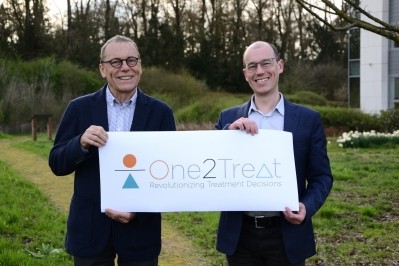Vox Pop Pharma – the industry speaks out about advanced AI and biophysical modeling

The news that broke yesterday (April 3) confirmed the collaboration’s aim to speed up the creation of safer and more effective cancer therapies and saw responses come in from across the pharma sector.
Let’s hear what they had to add to the story.
Dr Jo Varshney, CEO, and founder of VeriSIM Life, says:
“Based on what we’ve seen, nearly all of the companies developing oncology drugs and seeking to use AI are applying it to the early discovery stage.
“The use case has been focused on generating new targets and quickly identifying molecules to engage them. But even with increasing computational capabilities, the translatability of these therapies is still lacking, with similar results to traditional drug design techniques.
“So, what we’re seeing is the industry come to appreciate that without better incorporating the complexity of biology such as physiology, OMICs, toxicity, and efficacy, you can’t meaningfully cut development time and cost. And that’s exactly our focus: pairing biological knowledge with deep learning, to help companies reduce up to half of their preclinical R&D.”
Varshney was introduced to the world of drug development and research at a young age and an ethic of competitive achievement. She has front-led numerous collaborative engagements with a host of pharma clients, government agencies, academic and medical institutes, and industry innovators.
Josh Shubert, CTO of cancer AI imaging startup Avenda Health:
“One of the top challenges in prostate cancer is visualizing the tumor’s size and extent. In other types of cancer, we can see the lesion just fine, but without fully characterizing the tumor, therapy selection is challenging.
“Right now, our AI has a fundamental understanding of prostate cancer pathology that is enabling new and powerful clinical insights, but the goal is to build on top of that to create a model that provides similar great benefits for multiple cancers. By continuously improving our cancer AI, we can give doctors and patients a clearer picture of their tumor to enable confident and optimal therapy.”
Dr Joe Oakley is medical director in biomarker development at Paige.
He said: “Trained correctly and deployed thoughtfully, machine learning and artificial intelligence algorithms can be a powerful tool in drug development and patient care. The ability to synthesize data from pathology and radiology images, clinical laboratory results, and clinical trial results will lead to new hypotheses and new treatments, and potentially improve patient identification. Screening with some of these new tools can speed clinical trial enrollment, even possibly reduce the number of patients required to prove efficacy, by identifying not only that a patient is a candidate for a clinical trial, but which candidate might be best for that patient. These types of collaborations are how we will build these tools.”
Mika Newton is chief executive officer of xCures, an AI-assisted platform that automatically retrieves and aggregates medical records. The company is working directly with this type of data to create safer therapies for patients around the world.
Newton said: “By bridging the gap between raw data and actionable insights, we are setting a new standard in the quest for curing cancer. The integration of AI and biophysical modeling is not merely a tool for research; it's a cornerstone for the next generation of oncology care, where personalized treatment plans become the norm, not the exception.”
CEO of Larkspur Biosciences, Catherine Sabatos-Peyton said:
“Incorporating bioinformatics into discovery processes presents a significant opportunity for the next generation of cancer treatment strategies.
“Recent advancements, such as Larkspur's LARKX platform enabling targeted protein degradation of PIP4K2C and the discovery of orthogonal cancer-intrinsic mechanisms of immune evasion, underscore the promising potential of applying machine learning to clinical datasets. By leveraging the power of bioinformatics approaches, companies can refine patient biomarker strategies that will streamline the design of more efficient clinical trials, expedite drug development processes, and improve treatment outcomes across different types of cancers.”
Dr Kjell Carlsson, head of AI strategy at Domino Data Lab is a former principal analyst at Forrester focused on AI, ML, and advanced analytics.
He said: “The use of AI for detecting cancer is already well established – for example, Johnson & Johnson has created tools that use deep learning-based computer vision to help physicians navigate bronchoscopes to tumors and to identify differences in tumors that suggest different treatments. With the advent of Generative AI (i.e., transformer networks), the exciting new opportunity is to use AI to accelerate the discovery and development of new cancer drugs. For example, FogPharma is using generative AI to design novel peptides for the treatment of cancers.”
Vishal Sikri is president of the advanced diagnostics division at NeoGenomics.
He said: "Digital datasets along with outcome data are being utilized today to develop algorithms using AI tools that will not only speed up drug development but also change how therapy will be ordered in the future post-drug approval. At NeoGenomics, we continue our commitment to leverage data to support new and improved therapies that allow patients to have better outcomes."
Jorge Moura Sampaio, bioengineering lead at Loka, said:
“Oncology research is a complex issue. On one hand, the complexity of tumor microenvironments (TMEs) calls for an understanding of intricate cellular and molecular systems that are not always comprehended. On the other hand, patient-to-patient variability renders the traditional medicine approach of ‘one-size-fits-all’ insufficient.
“The availability of high dimensional datasets e.g., scRNA-seq data, combined with improvements in powerful computing systems and creative developments in deep learning architectures, has caused a rapid increase in applications of AI on both fronts. Machine learning can model tumor environments and predict drug effects, as well as analyze clinical trial data to assess survivability and potential side effects in different patient groups. With the integration of these technological developments into clinical practice, we anticipate a significant transformation in the approach to cancer treatment, with artificial intelligence becoming a major influence."
Your views are always welcome, if you'd like to contribute, please email Liza Laws, senior editor: Liza.Laws@wrbm.com































